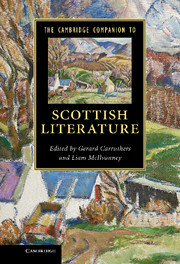Book contents
- Frontmatter
- Contents
- Notes on Contributors
- Acknowledgements
- Chronology
- Introduction
- 1 Scottish Literature before Scottish Literature
- 2 The Medieval Period
- 3 Reformation and Renaissance
- 4 The Aftermath of Union
- 5 Robert Burns
- 6 Enlightenment, Romanticism and the Scottish Canon
- 7 Scott and the Historical Novel
- 8 The Gaelic Tradition
- 9 Scottish Gothic
- 10 Victorian Scottish Literature
- 11 Robert Louis Stevenson
- 12 Hugh MacDiarmid and the Scottish Renaissance
- 13 Popular Fiction
- 14 Muriel Spark
- 15 The Glasgow Novel
- 16 ‘What is the language using us for?’
- 17 The Emergence of Scottish Studies
- 18 Otherworlds
- 19 Scottish Literature in Diaspora
- Index
- References
14 - Muriel Spark
Published online by Cambridge University Press: 05 January 2013
- Frontmatter
- Contents
- Notes on Contributors
- Acknowledgements
- Chronology
- Introduction
- 1 Scottish Literature before Scottish Literature
- 2 The Medieval Period
- 3 Reformation and Renaissance
- 4 The Aftermath of Union
- 5 Robert Burns
- 6 Enlightenment, Romanticism and the Scottish Canon
- 7 Scott and the Historical Novel
- 8 The Gaelic Tradition
- 9 Scottish Gothic
- 10 Victorian Scottish Literature
- 11 Robert Louis Stevenson
- 12 Hugh MacDiarmid and the Scottish Renaissance
- 13 Popular Fiction
- 14 Muriel Spark
- 15 The Glasgow Novel
- 16 ‘What is the language using us for?’
- 17 The Emergence of Scottish Studies
- 18 Otherworlds
- 19 Scottish Literature in Diaspora
- Index
- References
Summary
In 1985, Muriel Spark was acclaimed ‘the most gifted and innovative British novelist of her generation’; after her death in 2006, tributes and accolades multiplied, none, perhaps, more fitting than that of a fellow Scot, Ian Rankin, who deemed her ‘the greatest Scottish novelist of modern times’. Poet, playwright, editor, biographer, essayist, short story writer, most of all novelist, Muriel Spark achieved an eminence denied by few, but her work is often misinterpreted or misunderstood. Though she lived outside Scotland for most of her life, Spark was a Scottish writer, indelibly stamped by her first nineteen years in Edinburgh: she was ‘Scottish by formation’. And she was a theological writer, an artist of religious conviction and spiritual concerns, a Roman Catholic by conversion.
In Spark’s first novel, The Comforters (1957), Caroline Rose labours to integrate the demands of her faith within the context of her own life as a fledgling novelist. In this novel of decided autobiographical import for Spark (in addition to her conversion and artistic calling, Caroline is part Jewish), Caroline achieves a personal integrity, rejecting the evils embodied in the self-righteous Georgina Hogg, the detached contemplation of Edwin Manders and the misguided charity of Helena Manders as well as the diabolism, hedonism and nihilism displayed by other characters. In the end Caroline accepts the reality of the supernatural voices writing her novel for her, and acquires a more charitable attitude towards others, however physically repulsive or morally repugnant she may find them. The outward conversion that took place before this novel began finds its necessary complement in this inward conversion, and The Comforters ends with Caroline’s laughter echoing throughout a succinct parable of possibility. A lesser achievement in the canon of Spark’s works, The Comforters sets out her enduring concerns with matters of faith and fictionality.
- Type
- Chapter
- Information
- The Cambridge Companion to Scottish Literature , pp. 203 - 216Publisher: Cambridge University PressPrint publication year: 2012

